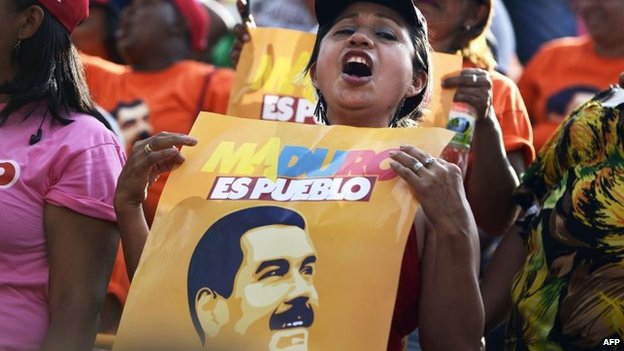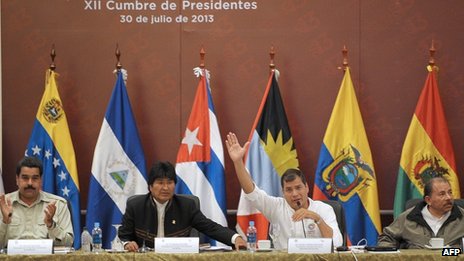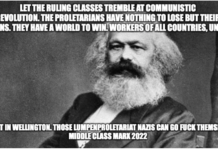Supporters of President Maduro in Venezuela rally
Since the 1980s we have had drubbed into our heads that there was no alternative to the economic and social policies unleashed at that time. It even had it’s own acronym – TINA.
The brutal reality was that wherever these policies were applied with force and rigour the growth rates declined and inequality and poverty grew massively.
This was true for New Zealand, the US, the UK, and most of Latin America.
Unfortunately for the Anglo-Saxon world there has not been much change. But in Latin America we have seen dramatic shift to the left in governments across the region. This includes Brazil, Argentina, Venezuela, Bolivia, Ecuador, Uruguay, Nicaragua, El Salvador and Chile. Left wing presidents in Honduras and Paraguay were overthrown in 2009 and 2012 respectively in US supported coups. There has beeen a flowering of social and economic policies that have recalimed national resources and directed social supports to the poor. As a consequence economic growth rates have improved (despite the 2008-9 world economic crisis) and poverty and inequality has been reduced in country after country.
The range of policy options are pretty broad.
We have the relatively mild left seen in Brazil under President Lula and now Dilma Rouseff from the Workers Party (WP). The WP never had a majority in their congress so it is hard to know what they would have done in those circumstances. However, they did preside over a major decline in extreme poverty rates from a relatively simple policy called bolsa familia which provides a cash payment family benefit to millions of poor families with the only condition being that the kids go toschool and get health checkups. Paying cash directly to families with children met stiff opposition. New Zealand also used to have a universal benefit that paid a cash benefit for all children. That was eliminated in the 1980s and been replaced with in work tax credits for the working poor.
At the further left of the spectrum we have the governments of Bolivia and Venezuela. In both cases the governments have emerged out of mass struggles over many decades that have provided a tested leadership determined to lead a mass democratic revolutionary transformation of their societies. They have challenged the corrupt elites, nationalised large swathes of the economy, empowered indiginous communities and are trying to create a real peoples power to replace the old state machine.
In Venezuela growth rates more than doubled in the period of the presidency of Hugo Chavez. More importantly the revolutionary government siezed control of the ostensibly state-owned oil company in 2004 which was being used to siphon wealth off to a corrupt layer in the state and business into an instrument to fund social programmes that benefited the poor. Poverty rates radically declined, income inequality declined, education enrollments exploded, illiteracy was eliminated, health care was established free for all and available through clinics being estab lished in all communities. Even inflation which remains stubbornly high was halved on average. However the last two years has seen a surge in inflation once more and the debate on what steps are need ed to advance the revolution has broken out publicly. The government remains committed to protecting the low paid and poor so social programmes and large increases in wages and pensions continue to be mandated by the government.
In Bolivia, the nationalisation of the giant natural gas fields brought a dramatic improvement in government income that has been ploughed into improved social programmes. Health and education have become rights for all not a luxery for the few. Illiteracy has been eliminated. (See Bolivia: A glance at the most important achievements of the new economic model).
A key facftor ensuring popularity for some tof these governments has been the solidarity and support of revolutionary Cuba. Thousands of doctors and teachers were able to be sent to provide immediate and tangible improvements in the lives of the majority while new infrastructure was being built and doctors trained for the long term.
Because Venezuela has substantial oil wealth it has been able to use this wealth to assist other left wing governments in the region. This was true in particular in the very poor countries of El Salvador and Nicaragua where former revolutionary guerrilla movements now hold elected office. The remarkable election in El Salvador last month are discussed here. A review of the comeback for Daniel Ortega and the Sandinista National Liberation Front in Nicaragua see Nicaragua Vive! 35 years since the triumph of the Sandinista Revolution. This alliance between the most progressive and revolutionary governments has been formally constituted as the ALBA (formally, the Bolivarian Alliance for the Peoples of Our America – Spanish: Alianza Bolivariana para los Pueblos de Nuestra América).
Leaders of Venezuela, Bolivia, Ecuador and Nicaragua at Alba summit, 30 July 2013
Also important to progress being able to be made in the face of US pressure and hostility has been the ability of China to provide alternative trade outlets to that of the US. Just this month the BRIC nations (Brazil, India, Russia, China and South Africa) announced the establishment of a financial system outside the control of the Western dominated Bretton Woods system. The US continues to insist on free investment protections in so-called “free trade” agreements before opening up their markets. These investment protections would have made it impossible for any country to take control of their resources if they were already controlled by foreign capital.
What would have happened if these countries had followed the neoliberal model is also demonstrated by what happened to that of the rest of Latin America. In 1993 Mexico signed a free trade agreement with the USA and Canada. Since then “while countries like Brazil and Venezuela have lifted millions out of poverty, Mexico’s stagnant poverty rate and growing population meant that an additional 14.3 million people were left below the poverty line in 2012 as compared to 1994, the first year under NAFTA”. (SeeNafta Advocates continue to make misleading claims).
The different governments of the “left” have mant different approaches to the challenges they face. What they have in common is a rejection of the so-called “Washington concensus” that proved to be such a disaster for their individual countries and their region for most of the 1970s, 1980s and 1990s. One difference that has emerged in recent years has been governments being elected to office that openly declare that their objective is to overthrow capitalism and create a new peoples power based on conscious mass involvement. This experience is discussed theoretically in a 2010 article by Marta Harnecker called “Ideas for the Struggle” and a new book called “A World to Build
New Paths toward Twenty-first Century Socialism”. In these develops the view that is it important to win government through elections if possible. But winning an election is not winning power. It is the beginning of a “process of peaceful, institutional transition, with many limitations that have to be understood.” To succeed “a broad national majority is needed in order to advance in a democratic manner towards a new society…. Therefore, not only is the unity of revolutionaries fundamental; we must also be capable of convoking all those who share a common vision for a more just and solidarity-based society.” (See an interview with Marta Harnecker on El Salvador, a new progressive hope in Latin America.)







Interesting article, Mike, but you might want to correct this typo…”in the 19080s”…that’s a long time in the future!
Noam Chomsky has written extensively on South American politics and I would recommend his thoughtful analysis to all readers.
The new TINA slogan is “the world has changed” which carries the implication that the neoliberal revolution is permanent and we can’t mine our own history for examples of how to deal with poverty in NZ
I have mentioned this before about South America,…and also the social democracies of the Scandinavian nations… some of the most wealthy per capita nations today.
Probably the easiest for us to understand is the Keynesian economic model we once practiced -whereby tenets of neo liberalism are only but a small part of a healthy economy….a VERY small part with capital letters.
I have also mentioned that everywhere neo liberal economics is practiced it has generally resulted in the same : a disenfranchisement of the majority and the enrichment of the few. Always.
How hard is it to present a working model on already existing examples?…answer. It isnt.
Its all there for the lazy ,moaning Kiwi to take notice of…it really wouldnt be hard to set up a group designated to study all examples and find the most equitable one and implement it.
But no…our MSM are in it for short term gain, as are our political leaders, too many people care not about others in society so long as their back yard isnt affected, …
And I am afraid that until that day….when extreme poverty grips this country to the point of politicization of a critical mass of people…..we will not see the ‘radical’ change necessary.
We are different from latin American nations inasmuch as we do not have the same family/tribal/communal emphasis, nor are we an old country , nor are we as politicized or have the same populations..to drive out negative ideologies such as neo liberalism.
It is surprising just how few have even heard of Keynesian economics, yet most nowadays know what the label ‘neo liberalism ‘ is roughly about….I would suspect this is a deliberate move in our media and universities…to dumb us down.
Certainly it was deliberate in regards to the idiot politicians we have had for the last 30 years who have made it the state religion.
Im sorry to say that you can have all the social policies, trade deals, initiatives to fight poverty you like, but until that fundamental flawed monetarist ideology is firmly and emphatically outed forever..we will continue to suffer and scratch our heads wondering (like idiots) why we just cant seem to get any traction on the issues of social equity.
Not realizing that the joke was on us and the trickle down effect dried up years ago.
Although it is encouraging to see left wing policies apparently working in South America, high inflation in Venezuela remains a problem. I cant help thinking that the dominance of petro-dollars in the economy is itself a problem (Australia’s dependence on mining seems to have a similar effect) and that oil production needs to be scaled back.
Would this reduce the rate of social change that these nations are enjoying? Not necessarily. I am surprised that these socialist countries have not attempted to nationalise the banks. Your comment that ” until the fundamentally flawed monetarist ideology is firmly and emphatically outed forever, we will continue to suffer” and the article comment that “BRICS announced the establishment of a financial system outside the control of the Western dominated Bretton Woods system” seem to be pointing in the right direction.
Until the state, rather than the private banks, control money creation there will always be inequality and inflation. Either the Democrats (Social Credit) or PositiveMoney models would be adequate. Neither advocate nationalisation of banks, though I suspect that share-holding banks are incompatible with a free democracy. The giving of cash to workers to educate their children is not far from the idea of a Social dividend or a Guaranteed Minimum Income either.
A number of solutions exist, all of them better that the present failed neo-liberal ideology.
100% agree!!
¡VIVA CHAVEZ AND MADURO!
By they way. Since yesterday you can watch “Telesur english”. It is a latin american revolutionary channel. Look for it in internet. Really cool one.
Thanks Mike for this cool article!
NZ politicians will ensure that the citizens of this country have their feet nailed to the deck of the sinking ship until it goes right under. As far as National, Labour, the Greens, and anybody else who might pop their head up, TINA to being subservient to international money-lenders and corporations. And anyone who suggests there might be an alternative gets assassinated.
Comments are closed.